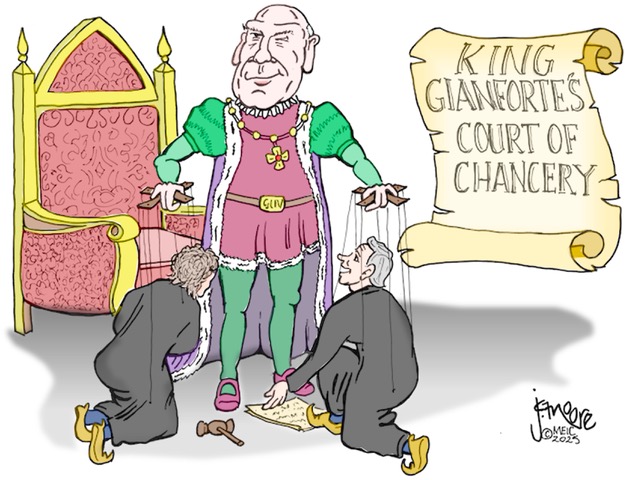
Cartoon by John Moore, used with permission.
by Anne Hedges & Derf Johnson
There are so many victories and losses in a single session that it is difficult to write a legislative recap. From a high level, the most significant losses involved the Legislature’s attack on the Montana Environmental Policy Act (MEPA) and the Montana Clean Air Act in order to prevent the state from considering the impacts of climate change in permit reviews (see article on pg. 14). Water resources were the target of several significant pieces of legislation, many of which were amended to be less harmful; but the ones that did pass will result in more toxic pollution and more nutrient pollution (see article on pg. 17).
All things considered, however, there were many bright spots. With 4,495 bill drafts requested, 1,759 bills introduced, and 884 bills passed, it was a busy session with quite a few victories. Montanans may have a law that allows communities to develop solar projects and share the energy produced among people who otherwise don’t have access to the benefits of cheap solar power (see article on pg. 20). Legislators also coalesced around support for new and improved transmission projects to improve the reliability of the electric system (see article on pg. 22). Oddly enough, Robert F. Kennedy, Jr. had a positive impact on younger Republican legislators, causing them to speak up and vote in favor of phasing out styrofoam (unfortunately, the governor vetoed the legislation), as well as decreasing the amount of “forever chemicals” (known as PFAS) in our environment (see article on pg. 24). NorthWestern had a slew of bad bills to allow it to avoid Public Service Commission oversight, but those bills failed, as did a number of bills that would have crippled the wind industry in the state by forcing developers to pay outrageous bonds (they already are required to bond) or severely restricted the location of wind turbines (measures that would prevent developers from locating turbines anywhere in the state).
One victory revolved around HJ 61 (Rep. Joshua Seckinger, D-Bozeman), a study bill that would evaluate the rapidly rising costs of property insurance costs in Montana. Currently, Montana has one of the fastest growing costs associated with property insurance in the nation, likely due to a multitude of factors including increased home prices, inflation, and the increasing prevalence of construction in the Wildland Urban Interface. If the study is conducted, it would also make recommendations for addressing the problem to the 2027 Montana Legislature.
Possibly the greatest victory this session, though, is the defeat of numerous measures attacking the judiciary and rule of law. Most importantly, a number of bills aimed to make judicial elections partisan in nature, but all failed to pass muster due to bi-partisan opposition. These bills would have hyper-politicized our judicial system and allowed for judges to be elected based on party affiliation rather than competence and experience. Additionally, proposals for the creation of a “general claims” or “court of chancery” failed, which would have required that constitutional challenges be brought in a special, intermediary court with justices hand-picked by the Governor (rather than elected by the people). While attempts at judicial “reform” failed this session, these bad ideas are almost certainly coming back in 2027.
MEIC’s staff is relieved the session is over and is ready to switch gears to undo the damage caused by the Legislature and to push back against the seemingly daily assault against public health and environmental protections coming our way from the chaotic and destructive federal government. We have been heartened by our members showing up again and again to testify, contact legislators, and join our weekly calls. We may have our work cut out for us going forward, but the burden is more manageable when you, our members, are in it with us.
This article was published in the June 2025 issue of Down To Earth.

